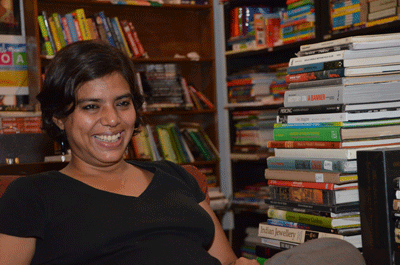Literati is a haven for those of us who love the combination of books, coffee and meeting diversely interesting people. The Goan speaks to Divya Kapur, the woman behind the magic

As a little girl growing up in the big city, Divya Kapuralways had a dream, a dream that would push her to one day step outside of hercomfort zone, venture into the unknown, and see her set up her own book storemiles from home, in a place that she would soon uproot herself and relocate to.
Having grown up with a fondness for books, her eventualchoice of profession was not surprising. However, with a legal profession onthe cards, and the finances to set up a startup enterprise in a city thatrequires capital above the reach of the common man, the dream was shelved foryears. “I have had to shuttle from Bangalore to Delhi, and had a year away inParis as well,” Kapur reminisces, “Eventually, life as a litigator was just tooexhausting to handle.”
Having made the decision to take a step in a new direction,the question arose of the optimum location for such a venture. “Goa was theoptimum choice in many aspects. Not only was the capital required not as muchas the cities, but the state also affords a rich interaction with various kindsof people, and that enables you to find ways in which both your life and workcan merge.” she says. Thus Literati Bookshop and Café was born.
While the bookshop serves as a place where people can peruseliterary works, it also serves as a meeting place for people to interact andenjoy an excellent cup of coffee (the latter being something that Divya takesgreat pride in). Several documentaries have been screened in the colonialgarden surrounding the shop to overwhelming response. “We had people queuing upto the pathway leading in,” Kapur laughs.
But Literati is more than just your average bookshop. Theventure also undertakes various projects, from supporting the smaller causes ofother individuals and institutions, to its own Bebook project, a ventureaimed at helping under-privileged children develop through reading.
“The aim was to give children the opportunity to learnthrough reading. And I think it has made a difference. At the end of the day, Ihave noticed that there has been a significant change in the behavior of thesame children. Though initially perhaps a bit reticent, they seemed far moremature over the course of time that the project worked with them. That’s morethan I could have hoped for,” Kapur tails off.